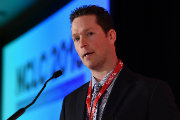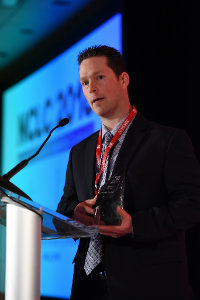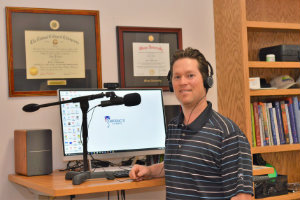ACA Researcher of the Year Explores Chiropractics Untapped Potential


James M. Loy, Miami University
As with all health professions, there are still many mysteries surrounding chiropractic care. Even though the practice is growing, the extent of its effects and applications are not yet well known.
However, research and awareness continue to expand. And the American Chiropractic Association (ACA) has recently honored Dean Smith, Miami University senior clinical faculty member, for his contributions with the 2018 George B. McClelland Researcher of the Year Award.
 Upon receiving the news, “I was in disbelief,” Smith says. “Because when I look at the list of previous winners, they are the stars of our profession. So I couldn’t believe anybody would think of me in that kind of category. This definitely surpasses anything I could even dream about.”
Upon receiving the news, “I was in disbelief,” Smith says. “Because when I look at the list of previous winners, they are the stars of our profession. So I couldn’t believe anybody would think of me in that kind of category. This definitely surpasses anything I could even dream about.”
As an exercise science specialist in Miami’s College of Education, Health and Society, Smith explores the intersections of chiropractic treatment, exercise, and human performance. His work also studies how various adjustments can affect speed, accuracy, and postural control, as well as the overall quality of movement.
More recently, Smith and his colleagues completed a lengthy study funded by the U.S. Department of Defense. By working with special operation forces, they examined how chiropractic can impact the response rates of both simple and complicated movements.
“We had them do 100 button presses and we looked at how fast they could do them before and after a series of treatments,” says Smith. “And the results essentially showed that that particular task really seemed to show the effect. People got faster.”
His additional projects have demonstrated that as little as 30 minutes of exercise can also improve movement time, and that lower body joint adjustments can improve the balance of healthy young adults.
And alongside his research, Smith also founded and hosts a podcast called Chiropractic Science, which brings together leading researchers and professionals to discuss current trends and new findings.
“I went into research because there was a lack of evidence out there and I started the podcast for the same reason,” Smith says. “When I look at the public perception, and the public information that’s out there about chiropractic, I saw a big void. I realized it wasn’t going to be completely filled by any one thing. But I wanted to help a little bit, help chiropractors know that there is actually some really good research.” 
The goal of the podcast is to engage and educate both researchers and practicing professionals. But it is also about promoting a more mainstream level of awareness and understanding. Because, according to Smith, chiropractic care still carries a number of common misconceptions.
One misconception is that some treatments can be unsafe or risky. However, “the reverse seems to be true,” Smith says. “Because if you look at the effects care compared to drugs or surgery, we’re significantly safer.”
Another is that it only serves to treat neck and back pain, or headaches. While these are the most common reasons people see chiropractors, patients frequently suggest that chiropractic can also help relieve stress, improve sleep, boost the immune system, and more.
Other benefits are even being leveraged at the highest levels of athletic performance.
“We are starting to see some studies in that realm now,” Smith says. “But again, there are very few. But if you look at, for example, professional teams like the NFL. Every NFL team has a chiropractor. It’s one of those things where the research is not quite caught up to the practice.”
So as evidence and support for chiropractic science continues to increase, so do the vast amount of opportunities to learn more. Which is a very welcome prospect for the 2018 ACA Researcher of the Year.
“I could keep busy for 10 lifetimes,” Smith says. “I want to continue to examine what chiropractic can do for postural control [and] on the quality of movements. Another big area is what happens when we combine things. So I am looking now to see how exercise relates. And what if we couple chiropractic and nutrition? These are the lifestyle things that I think are going to have a bigger impact on the way people live.
“And that is really exciting.”

